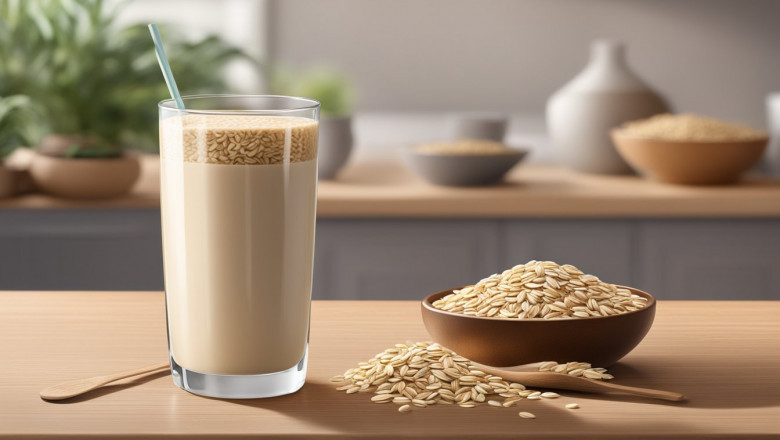views
The oat-based beverage market has witnessed exponential growth in recent years, driven by an increasing shift toward plant-based alternatives. This has prompted intense competition among various brands and companies, as they vie for market share. Oat milk, in particular, has emerged as a frontrunner in this sector, benefiting from its nutritional profile, environmental benefits, and versatility as a dairy substitute. This article delves into the competitive landscape of the oat-based beverage market, examining the major players, market dynamics, and strategic approaches.
Key Market Players
The oat-based beverage market features several key players vying for dominance. Among the leading brands are Oatly, Califia Farms, and Planet Oat, each with a distinct competitive edge. Oatly, one of the first brands to make a significant mark, has capitalized on its early-mover advantage by establishing a strong brand presence and fostering consumer loyalty. Its innovative approach to oat milk production, combined with a compelling sustainability narrative, has allowed it to become a household name.
Meanwhile, Califia Farms has made its name by offering a variety of oat-based drinks, catering to diverse consumer preferences. The brand's product range spans from sweetened to unsweetened options, catering to both health-conscious and flavor-driven consumers. This broad portfolio has contributed significantly to its growth in the competitive oat-based beverage market.
Planet Oat, another strong contender, has also been gaining traction. With an emphasis on affordability and mass-market appeal, it provides a range of oat-based drinks that appeal to price-conscious consumers. The brand's presence in large retail chains has allowed it to secure widespread distribution, which is crucial in the highly competitive beverage sector.
Competitive Strategies
Competition in the oat-based beverage market is not only about brand recognition but also hinges on the ability to meet evolving consumer demands. As consumers increasingly focus on health, nutrition, and sustainability, brands are tailoring their offerings to meet these preferences. Companies are also investing in product innovation to differentiate themselves from the competition.
One key area of focus is the nutritional profile of oat beverages. Some brands are fortifying their products with additional nutrients such as calcium, vitamins, and probiotics, targeting consumers looking for functional beverages that offer more than just hydration. This differentiation in product offerings gives brands a unique selling point in a crowded market.
Sustainability is another crucial factor. With rising concerns over environmental impact, oat-based beverage companies are emphasizing their commitment to eco-friendly practices. Oatly, for instance, has leveraged its environmental credentials in marketing campaigns, highlighting its use of renewable energy in production and the lower carbon footprint of oats compared to other crops like almonds and dairy.
Market Trends Driving Competition
A significant driver of competition in the oat-based beverage market is the growing demand for plant-based milk alternatives. As dairy consumption continues to decline, consumers are increasingly seeking plant-based beverages that align with their dietary preferences or ethical beliefs. Oat milk, in particular, has become a popular choice due to its creaminess, flavor, and sustainability. This trend is compounded by the increasing availability of oat-based beverages in coffee shops, supermarkets, and convenience stores, making it more accessible to a wide range of consumers.
Additionally, innovations in product formats and flavors have intensified competition. The availability of flavored oat milk, such as vanilla and chocolate, appeals to both children and adults alike. Some companies are also expanding into the foodservice industry, offering oat-based beverages as an alternative to dairy in coffee shops and cafes, further increasing their market presence.
Strategic Partnerships and Acquisitions
To gain a competitive edge, many players are forming strategic partnerships and making acquisitions. Collaborations between oat beverage producers and major retailers or foodservice chains have allowed brands to enhance their distribution capabilities. This expansion into new channels is essential in a competitive market, as it ensures that products reach a broader audience.
Moreover, acquisitions have become a prevalent strategy for expanding market share. Large beverage corporations are increasingly acquiring smaller oat-based beverage brands to diversify their portfolios and tap into the growing demand for plant-based alternatives. This consolidation trend is expected to continue as competition intensifies and companies seek to strengthen their positions in the market.
Conclusion
The oat-based beverage market is highly competitive, with several well-established players driving innovation and responding to consumer demands. As the market continues to grow, companies will need to focus on sustainability, nutritional benefits, and product differentiation to stay ahead of the competition. The ability to forge strategic partnerships and expand distribution will also be crucial for long-term success in this fast-evolving market.






















Comments
0 comment